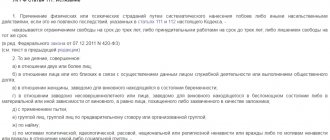Lawyer under Art. 285 of the Criminal Code of the Russian Federation Abuse of official powers
What should be primary for a person: public or personal?
For most people the answer is obvious. In general, today in society there is a popular trend towards maximum satisfaction of personal interests, desires, and respect for freedoms. However, for those who occupy certain positions in official government structures, everything is different. Not only do officials do not have the right to take into account their own interests, but also liability for violations is provided for in Article 285 of the Criminal Code of the Russian Federation.
What is abuse of power?
Abuse of official power is considered not only to place personal interests above official interests, a biased attitude towards someone out of self-interest, but also any significant violation:
- citizens' rights;
- rights of organizations;
- public interests protected by law;
- state interests.
Before committing an act that contradicts the job description or simply goes beyond its scope, it is worth carefully assessing the possible consequences.
Who is considered an official?
An official is a person in the service and vested with certain powers, for example, being a representative of the government or performing administrative, economic and other duties in state or municipal government bodies, institutions, corporations; funds. And also companies with state participation amounting to more than 50%.
Responsibility for abuse of power
Depending on the severity of the consequences and the scale of the position held, the court determines the punishment:
- If the damage is significant, the fine reaches 80 thousand rubles or six months’ income. A person may be prohibited from working in certain positions or conducting certain activities for five years, and may also be sentenced to perform forced labor for 4 years. An arrest can last 4-6 months, and imprisonment can last up to 4 years.
- If the culprit held a public post in the Russian Federation or a constituent entity of the Russian Federation, the fine increases to 100-300 thousand rubles, and the term of imprisonment - up to 7 years.
- If the offense entails grave consequences, the term increases to 10 years.
Responsibility and consequences are not limited to punishment. Even after the fine is paid or the term of the person convicted under Art. 285 of the Criminal Code of the Russian Federation, the internal security service will not allow you to work in most positions in government agencies. The stain on business reputation will remain indelible.
Analysis
When I began to get acquainted with the criminal case against K. and delve deeper into the situation, I was surprised to find only weak signs of “attracted” crimes.
The situation looked like this: K., a police officer, detective officer of the Department of Economic Crimes, who served in the Ministry of Internal Affairs for only 4 months, during his duty he went to the Geologist House of Culture to steal. He took an explanation from the woman who called the police, who at the same time refused to write a statement about bringing criminal charges against n/persons for theft. As a result, K. issued a decision to refuse to initiate criminal proceedings, citing Art. 7 of the Code of Criminal Procedure of the Russian Federation - due to the absence of a statement from the victim. He had no right to refuse to initiate a criminal case on this basis, since the law does not provide for the possibility of refusing to initiate a criminal case under Art. 158 of the Criminal Code of the Russian Federation (theft) on the basis of Art. 7 Code of Criminal Procedure of the Russian Federation. But instead of simply canceling the unlawful decision, the prosecutor’s office decided to prosecute K. himself. The investigation “saw” that K. in the explanation of the “victim” - K. wrote “loss” instead of the word “theft”, and also, contrary the will of the victim, in her explanation he indicated that she did not want to write a statement about bringing the thieves to criminal liability, and that the damage caused by the theft was not significant. And K.’s intention, according to the prosecutor’s office, was to hide the crime from being recorded, thereby improving the crime detection rate in the area.
The objective side of the composition (the unlawful actions of the accused) did not look very strong, to put it mildly: the words “loss” and “theft”, by and large, are not very different from each other. And under the phrases about the insignificance of the damage and the reluctance to write a statement in the protocol, there was the signature of the “victim” (she was a witness in the case). During the investigation, the victim testified that she did not say these words, but apart from K. and K-voy, no other persons were present when the latter gave her explanation. In the decision made by K. to refuse to initiate a criminal case, which he, nevertheless. had the right to make a decision that clearly indicated the fact of theft.
The subjective side (the thoughts of the accused regarding his actions) did not look any better: K., indeed, is not responsible for the percentage of crimes solved (if it were wrong) in the area and his salary does not depend on this in any way, he is an employee of the Department of Economic Crimes and his crimes are of a general criminal nature, in principle, they do not concern. In addition, with his 4-month experience in the “authorities”, it is simply stupid to try to discern in K.’s actions a deeper meaning regarding the desire to influence the crime detection rate.
The general impression was that the prosecution’s position was clearly rather weak, but how things would turn out further was still far from clear. Here it would be appropriate to remember the saying: “If you go to fight a jackal, get ready to fight a tiger.”
I turned to the leadership of the police department, which, as I understood, was not interested in their employee being found guilty. To confirm the absence of the subjective side of the crime in K.’s actions, I needed interrogations in court of a number of K.’s leaders, since the fact that I don’t see the subjective side of the crime is not the main thing, the main thing is to “show” this to the court... The employees I need are ready were to give the necessary testimony in court. In addition, we took a certificate from the Geologist House of Culture stating that the damage caused by the theft was indeed not significant. What supported K.'s testimony?
Defense under Article 285 of the Criminal Code of the Russian Federation
The sooner an official, when accused of abuse of power, contacts a lawyer under Art. 285 of the Criminal Code of the Russian Federation, the greater the chances of an effective defense, release from charges or an acquittal by the court.
People can be accused of using the position not only erroneously, but also out of resentment, anger, or a desire to harm. Under Article 285 of the Criminal Code of the Russian Federation, innocent people are often prosecuted. Abuse of power is a fairly broad concept, which covers a lot of actions and inactions in order to eliminate an unwanted official.
In a state of stress after arrest, a person can easily say something that will play a decisive role in the process, or that will be interpreted as an admission of guilt. It is important to immediately seek professional protection from a lawyer under Art. 285 of the Criminal Code of the Russian Federation, without waiting for them to “sort it out.” Even an innocent and scrupulously honest person needs legal assistance.
New trial
We, of course, were not going to give in and firmly stood in our positions.
The new trial mirrored the previous one. The only difference was that the prosecutor had changed again - now it was the second deputy prosecutor; and the fact that the “victim” - that is, the main witness for the prosecution, in court began, openly, to support our side. In court, the defense dealt only light blows to the weak points of the prosecution’s structure, and the prosecution fell apart like a sand castle... And in conclusion, the prosecution “received” an “honestly earned” acquittal in the case.
The second instance upholds the verdict.
This time the regional prosecutor did not file a supervisory protest.
PS During the consideration of the case, I considered the prosecutor’s private protest against the court ruling to be an inconsistency in the work of the prosecution, but later, analyzing the situation, I saw a certain meaning in this “inconsistency” - the cancellation of the court ruling and, accordingly, a change of judge, could quite realistically lead to to the other - a guilty verdict. And the prosecutor’s office apparently tried to strategically “play this card.”







